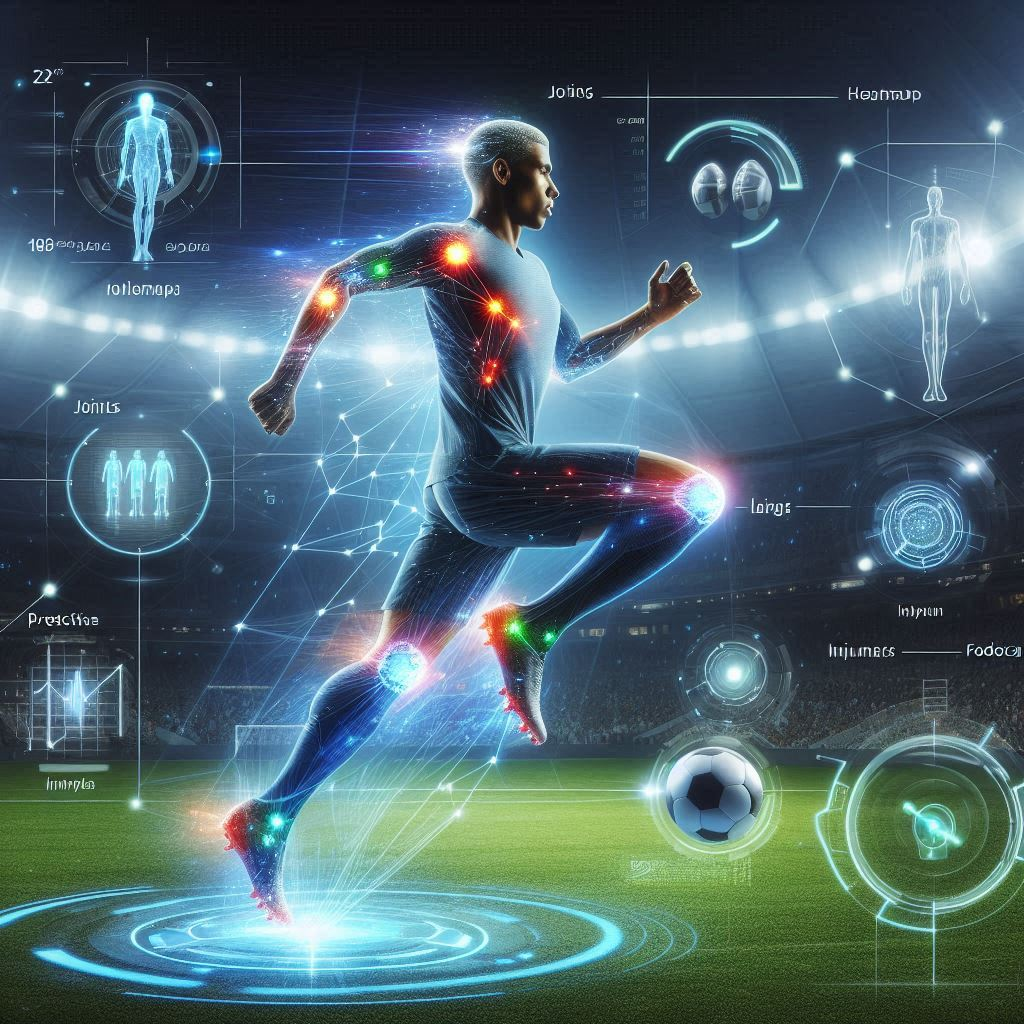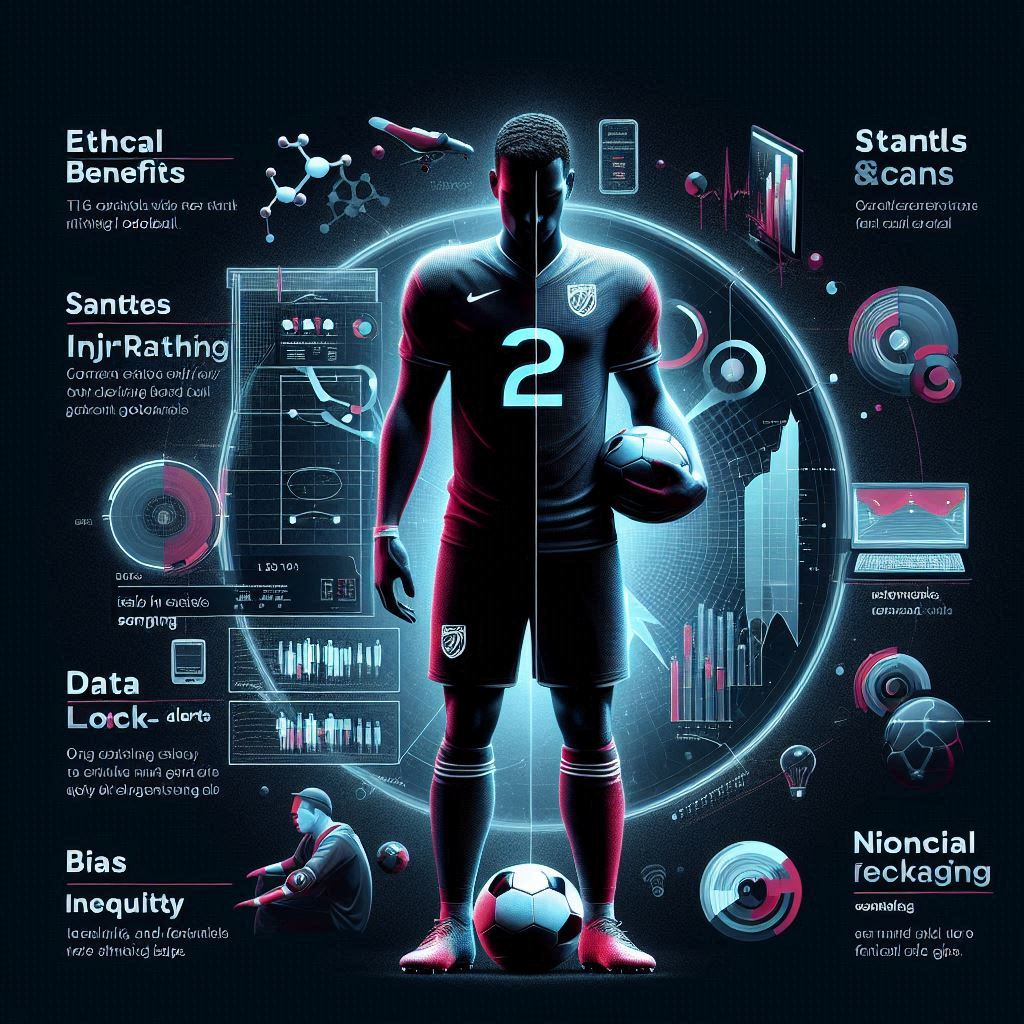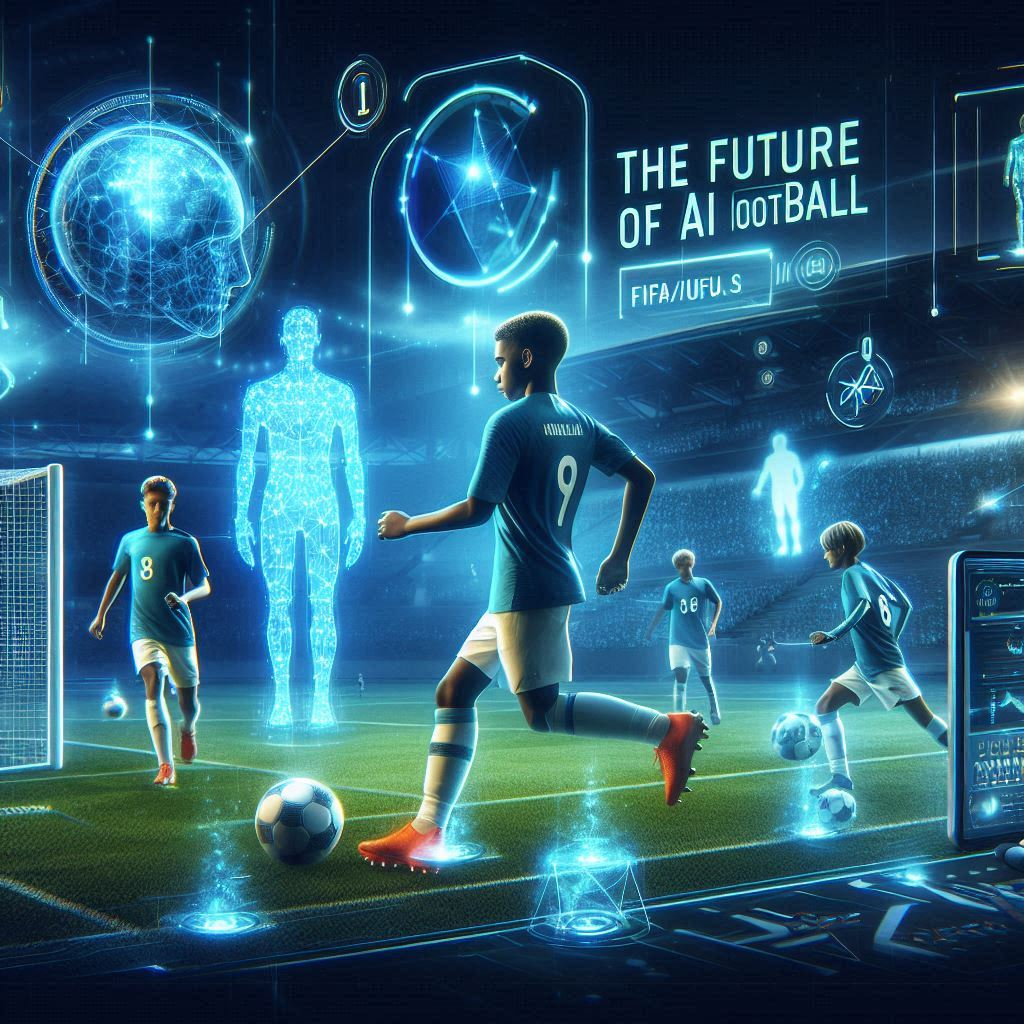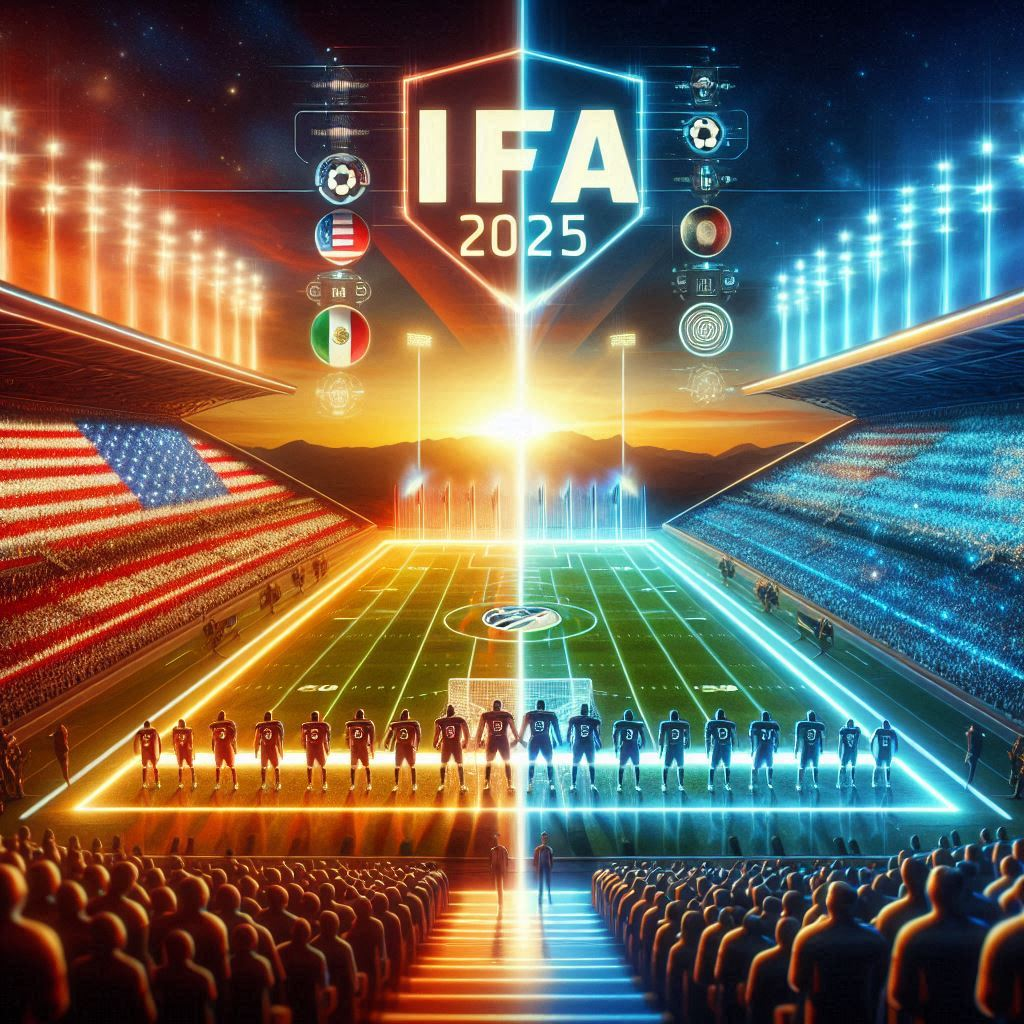The beautiful game has entered a new era where technology meets tradition in ways that would have seemed impossible just a decade ago. Football clubs worldwide are embracing artificial intelligence in sports to gain competitive advantages, optimize player performance, and revolutionize how fans experience matches. As we navigate through 2025, the integration of AI in football has moved beyond experimental phases into practical applications that are reshaping every aspect of the sport.

Introduction: Football Meets the Future
Football has always been a sport driven by passion, skill, and tactical brilliance. However, the modern game demands more than just raw talent and intuition. Today’s clubs are leveraging cutting-edge technology, including AI in Football, to analyze every touch, pass, and movement on the pitch. The rise of football analytics 2025 has created opportunities for teams to make smarter decisions, from transfer signings to match-day strategies.
This technological revolution, powered in part by AI in Football, isn’t just about replacing human judgment—it’s about enhancing it. Coaches, scouts, and analysts now have access to unprecedented insights that help them understand the game at a granular level. Throughout this article, readers will discover how data-driven football strategy is transforming player development, tactical approaches, and fan engagement in ways that are both exciting and practical.
The integration of smart football technology and AI in Football has created a new landscape where traditional football wisdom meets scientific precision. From grassroots academies to elite professional clubs, organizations are investing in these innovations to stay competitive in an increasingly demanding sport.
What Is AI in Football?

AI in Football encompasses various technologies that process vast amounts of data to provide actionable insights. At its core, AI involves machine learning algorithms that can identify patterns, predict outcomes, and automate decision-making processes that would take humans considerably longer to complete.
Key AI technologies transforming the landscape of AI in Football include computer vision systems that track player movements during matches, predictive modeling that forecasts injury risks, and natural language processing that analyzes media coverage and fan sentiment. These systems work together to create comprehensive profiles of players, teams, and tactical approaches.
Real-world examples demonstrate how AI in Football is being applied in practice. Manchester City’s use of advanced analytics has helped them identify undervalued players in transfer markets, while Bayern Munich employs AI-powered systems to optimize training loads and reduce injury rates. These applications show how football data analysis has evolved from simple statistics to sophisticated intelligence systems.
The technology behind AI in Football continues to advance rapidly. Machine learning models can now process video footage in real-time, tracking up to 25 different metrics per player during live matches. This capability allows coaches to make informed substitutions and tactical adjustments based on objective data rather than subjective observations alone.
Game-Changing Applications of AI in Football (2025 Trends)
a. Scouting & Recruitment
The traditional approach to player scouting relied heavily on human scouts traveling to matches and providing subjective assessments. AI scouting football has revolutionized this process by enabling clubs to evaluate thousands of players simultaneously across multiple leagues and competitions.
Modern scouting platforms use computer vision to analyze player movements, decision-making patterns, and technical abilities from video footage. These systems can identify promising talents in lower divisions or emerging markets that might otherwise go unnoticed. The best AI software for football scouting processes data from various sources, including match footage, GPS tracking, and performance metrics.
AI in player scouting has democratized talent identification by making it possible for smaller clubs to compete with larger organizations in finding hidden gems. The technology evaluates players based on objective criteria rather than subjective impressions, reducing bias and improving accuracy in recruitment decisions.
Several clubs have already seen significant returns on their AI scouting investments. Brighton & Hove Albion’s data-driven approach to recruitment has helped them identify undervalued players who later sold for substantial profits, demonstrating the financial benefits of incorporating artificial intelligence into scouting operations.
b. Tactical Strategy & Match Preparation
Football tactical analysis tools have evolved dramatically, enabling coaches to develop more sophisticated game plans based on comprehensive opponent analysis. These systems examine historical match data, player tendencies, and tactical patterns to predict how opposing teams are likely to approach upcoming fixtures.
The role of artificial intelligence in football training extends beyond physical preparation to include tactical education. AI systems can simulate different scenarios and show players how various tactical approaches might unfold during matches. This preparation helps teams develop multiple game plans and adapt quickly to changing circumstances.
Predictive analytics football applications help coaches understand which tactical approaches are most likely to succeed against specific opponents. By analyzing thousands of similar tactical situations from previous matches, these systems provide probability-based recommendations for formation choices, substitution timing, and strategic adjustments.
Modern football clubs use these insights to prepare detailed tactical reports that highlight opponent weaknesses and suggest optimal attacking patterns. The impact of data science in football matches becomes evident when teams can anticipate and counter their opponents’ strategies more effectively than ever before.
c. Performance Tracking & Injury Prevention
Football performance tracking has become increasingly sophisticated through the integration of wearable tech in sports and advanced analytics platforms. Players now wear devices that monitor heart rate, acceleration, deceleration, and biomechanical stress throughout training sessions and matches.
These monitoring systems provide coaches with real-time feedback about player fitness levels and help identify early warning signs of potential injuries. The use of VR and AR in football training has also expanded, allowing players to practice decision-making scenarios without physical strain while recovering from minor injuries.
AI algorithms analyze this performance data to create personalized training programs that optimize each player’s development while minimizing injury risks. The technology considers individual player characteristics, playing position requirements, and historical injury patterns to recommend appropriate training loads.
Football innovation 2025 includes advanced recovery monitoring systems that track sleep quality, nutrition intake, and stress levels to provide holistic player wellness insights. This comprehensive approach to performance tracking helps clubs maximize player availability while maintaining peak performance levels throughout demanding seasons.
d. VAR & Referee Assistance
VAR technology in football has undergone significant improvements through AI integration, making decision-making more accurate and efficient. Modern systems can automatically detect potential infractions and provide referees with enhanced video analysis tools that highlight key incidents from multiple angles.
AI-powered officiating assistance reduces the time required for VAR reviews by pre-analyzing footage and identifying the most relevant camera angles for specific incidents. This technology helps maintain match flow while ensuring accurate decisions in crucial moments.
The development of automated offside detection systems represents a major advancement in football officiating. These systems use multiple cameras and machine learning algorithms to determine player positions with millimeter precision, eliminating human error in offside calls.
Smart football technology in officiating extends beyond VAR to include communication systems that help referees coordinate with assistant officials and fourth officials more effectively. These improvements contribute to better match management and more consistent decision-making across different fixtures.
e. Fan Engagement & Smart Stadiums
Smart stadiums 2025 represent a significant evolution in how fans experience football matches. These venues integrate various technologies to provide personalized experiences, from customized food recommendations to optimized parking and transportation solutions.
AI systems analyze fan behavior patterns to improve crowd management, reduce waiting times, and enhance safety protocols. The technology can predict crowd movements and adjust facility operations accordingly, creating more comfortable and enjoyable match-day experiences.
Digital platforms powered by artificial intelligence provide fans with personalized content, including customized match highlights, statistical insights, and interactive experiences that deepen their connection to their favorite teams and players.
How AI is changing football extends to broadcasting, where intelligent systems can automatically generate highlight packages, provide real-time statistical analysis, and even create personalized commentary tracks based on individual viewer preferences.
Key Benefits of AI Integration in Football
The integration of AI in Football and other forms of artificial intelligence in sports has delivered measurable benefits across multiple aspects of football operations. Enhanced performance analysis allows coaches to make more informed decisions about player development, tactical approaches, and match preparation strategies.
AI in Football, combined with advanced football data analytics tools 2025, provides clubs with competitive advantages in transfer markets by identifying undervalued players and avoiding costly mistakes. The technology helps organizations make smarter investment decisions while reducing the risks associated with expensive player acquisitions.
Cost and time efficiency improvements enabled by AI in Football allow clubs to operate more effectively with limited resources. AI systems can process vast amounts of data in minutes that would take human analysts hours or days to complete, freeing up staff to focus on strategic decision-making and creative problem-solving.
Better health management for players is another key benefit of AI in Football, reducing injury rates and extending career longevity. The combination of performance tracking, predictive analytics, and personalized training programs helps players maintain peak physical condition while minimizing the risk of overuse injuries.
Ethical Concerns & Limitations

While AI in Football offers numerous benefits, its implementation also raises important ethical considerations that clubs and governing bodies must address. Privacy and data ownership concerns emerge when players’ personal information, including biometric data and performance metrics, is collected and analyzed extensively through AI-driven systems.
Over-reliance on algorithms presents risks when human judgment and intuition are dismissed in favor of data-driven recommendations. Football remains a sport where creativity, passion, and unpredictability play crucial roles that cannot be fully captured by mathematical models.
Bias in data sets and scouting algorithms can perpetuate existing inequalities in player recruitment and development opportunities. If training data reflects historical biases, AI systems may inadvertently discriminate against players from certain backgrounds or playing styles.
The cost of implementing advanced AI systems can create competitive imbalances between wealthy clubs and smaller organizations. This technology gap may widen existing disparities in football and limit opportunities for clubs with limited financial resources.
Top Clubs & Organizations Using AI in 2025
Several leading football clubs have emerged as pioneers in implementing AI in Football across their operations. Manchester City’s comprehensive approach to data analysis, powered by AI-driven tools, has influenced their success in both domestic and international competitions, setting standards for other clubs to follow.
Bayern Munich’s investment in AI in Football, particularly in performance tracking and injury prevention technology, has helped them maintain competitive advantages while developing young players more effectively. Their systematic approach to integrating AI into training programs serves as a model for other European clubs.
Startups and specialized platforms continue to drive innovation in the AI in Football and broader AI-in-sports space. Companies like StatsBomb provide advanced analytics services to clubs worldwide, while Hudl offers video analysis tools that help coaches and players improve performance through detailed match analysis.
Zone7 and other injury prevention platforms utilize AI in Football through machine learning to predict and prevent player injuries, helping clubs protect their valuable assets while maintaining competitive performance levels. These specialized services demonstrate how focused AI applications can deliver significant value to football organizations.
The Future Outlook: What’s Next for AI in Football?

Football tech trends indicate continued expansion of AI applications across all aspects of the sport. Youth academies are beginning to integrate performance tracking and development analytics to identify and nurture talent more effectively from early ages.
Broadcasting innovations powered by artificial intelligence will create more immersive and personalized viewing experiences for fans worldwide. These developments may include real-time tactical analysis, predictive graphics, and interactive features that allow viewers to access detailed player and team statistics during live matches.
Potential FIFA and UEFA innovations could standardize AI implementation across international competitions, ensuring fair play while embracing technological advancement. These governing bodies are likely to develop regulations that balance innovation with traditional football values.
The continued evolution of AI technology will introduce new capabilities that are currently difficult to imagine. As machine learning algorithms become more sophisticated and computing power increases, football clubs will gain access to even more powerful tools for analysis, strategy, and fan engagement.
Conclusion: Embracing the AI Era in Football
The transformation of the sport through AI in Football represents one of the most significant developments in football’s modern history. From player scouting to tactical analysis, and from injury prevention to fan engagement, AI technology is enhancing every aspect of the beautiful game while preserving its essential character and appeal.
As clubs continue to invest in AI in Football and related technologies, the balance between innovation and tradition becomes increasingly important. The most successful organizations will be those that leverage AI capabilities while maintaining the human elements that make football special—passion, creativity, and the unpredictable moments that create lasting memories.
The future of the game lies in embracing AI in Football alongside other technological advances, all while respecting the sport’s rich heritage. This evolution is not about replacing human judgment but about enhancing it, providing coaches, players, and fans with tools that deepen their understanding and appreciation of football.
What are your thoughts on AI in Football and the beautiful game? As technology continues to evolve, the football community must engage in ongoing discussions about how to implement these innovations responsibly while preserving the sport’s fundamental appeal and accessibility.
External Resources (DoFollow):
- FIFA – Technology in Football
- StatsBomb – Football Analytics Platform
- Hudl – Sports Performance Analysis
- Zone7 – Injury Prediction AI
- MIT Sloan Sports Analytics Conference







